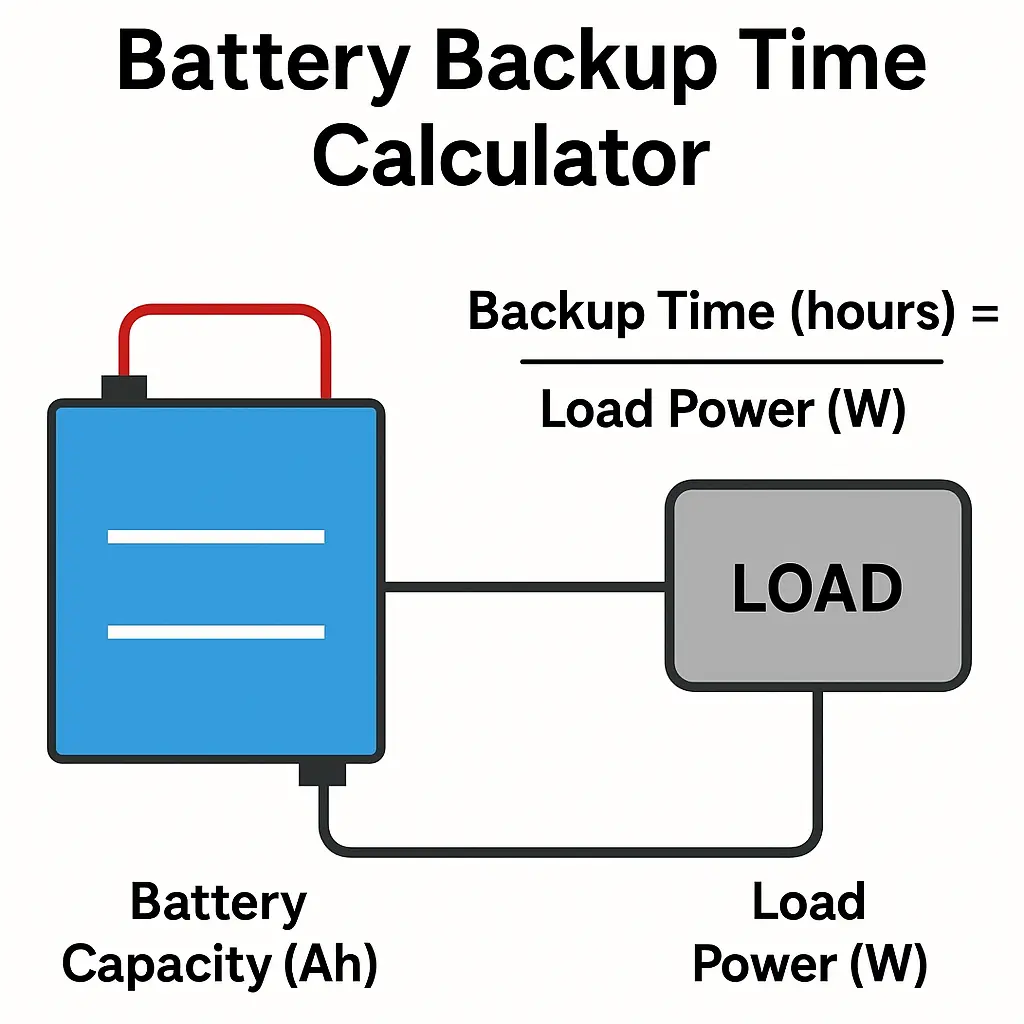Calculate your battery backup time
Use our battery backup time calculator to estimate how long your battery will last during power outages. It works with lead-acid, lithium-ion, UPS, solar, and car batteries.
Battery Parameters
Backup Time Results
Backup Time
Usable Capacity
Load Current
Recommended DoD
Common Backup Times
| Battery Capacity | 100W Load | 200W Load | 500W Load | 1000W Load |
|---|---|---|---|---|
| 50Ah (12V) | 5.4 hours | 2.7 hours | 1.1 hours | 0.5 hours |
| 100Ah (12V) | 10.8 hours | 5.4 hours | 2.2 hours | 1.1 hours |
| 150Ah (12V) | 16.2 hours | 8.1 hours | 3.2 hours | 1.6 hours |
| 200Ah (12V) | 21.6 hours | 10.8 hours | 4.3 hours | 2.2 hours |
| 100Ah (24V) | 21.6 hours | 10.8 hours | 4.3 hours | 2.2 hours |
Understanding Battery Backup Time Calculations
Calculating accurate battery backup time is essential for reliable power during outages. Our calculator considers all critical factors to give you precise estimates.
Key Factors in Backup Time
- Battery Capacity: Measured in Ah (Amp-hours)
- System Voltage: 12V, 24V or 48V systems
- Load Power: Total wattage of connected devices
- Efficiency: Inverter and battery losses
Battery Type Matters
Lithium (LiFePO4) batteries provide 80-90% usable capacity vs. 50-60% for lead-acid. This significantly impacts your actual backup time.
Example Calculation
100Ah 12V battery with 300W load:
Total Energy: 100Ah × 12V = 1,200Wh
Usable (80% DoD): 1,200Wh × 0.8 = 960Wh
Backup Time: 960Wh ÷ 300W = 3.2 hours

Estimate Battery Backup Time
Understanding your battery backup time helps ensure your essential appliances stay powered during outages. It’s especially important for solar and off-grid systems where energy availability can fluctuate.
A battery backup time calculator gives you accurate insights by factoring in load wattage, battery capacity, voltage, and inverter efficiency. This eliminates guesswork and helps optimize your energy setup.
Accurately estimating your backup time prevents system failures and helps determine how many batteries you’ll need for critical operations. It also helps you manage energy usage more efficiently.
Whether you’re planning a home solar setup or backup system for emergencies, using a battery backup time calculator ensures you’re prepared with the right energy storage solution tailored to your needs.
Battery Types Comparison
Lithium-ion
Depth of Discharge: 80-90%
Efficiency: 95-98%
Life Cycles: 2000-5000
AGM
Depth of Discharge: 50-60%
Efficiency: 85-90%
Life Cycles: 500-800
Flooded
Depth of Discharge: 40-50%
Efficiency: 70-85%
Life Cycles: 300-500
Tips to Extend Backup Time
To improve your battery backup time, start by reducing unnecessary power consumption. Focus on running only essential appliances like LED lights and fans during outages.
Maintaining your batteries in good condition directly impacts how long they can power your home. Regular maintenance and operating batteries at optimal temperature can help extend their life and efficiency.
Using energy efficient devices and pure sine wave inverters can reduce overall power draw, maximizing the available battery backup time from your existing system.
For extended outages, consider increasing your battery capacity. A larger battery bank, when properly sized, ensures longer runtime and better energy independence.
Battery Backup FAQs
Use this battery backup time formula: (Ah × V × DoD × Inverter Efficiency) ÷ Load (W). It tells you how long your battery will last based on your setup.
With a 12V 200Ah battery, backup time varies by load. For example: 100W ≈ 21.6 hours, 500W ≈ 4.3 hours. Higher loads drain the battery faster.
A 24V 150Ah lithium battery provides around 3–32 hours depending on your load. For example, a 500W load gives ~6.5 hours of runtime.
Your battery backup time depends on battery capacity, voltage, load size, and efficiency. Use a battery backup time calculator for accurate results.
A 1500VA UPS can last from 10 to 60 minutes based on battery size and connected load. A lower load (like a PC) gives more runtime.
For lithium batteries, use: (Ah × V × 0.85 × 0.95) ÷ Load (W). This battery backup time formula gives reliable results for most setups.
A 50Ah 12V car battery can run a 10W load for ~30 hours or a 100W device for ~3 hours. Avoid deep discharge to prevent damage.
